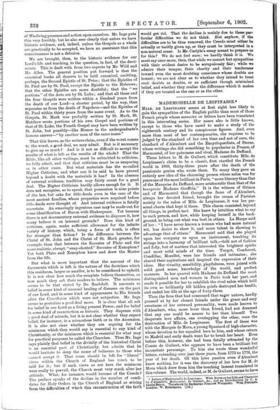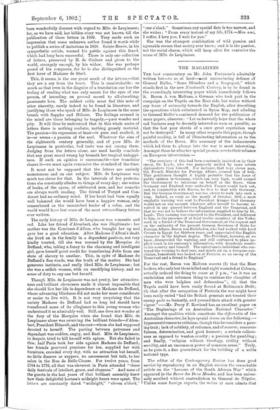MADEMOISELLE DE LESPINASSE.* MLLE nu LESPINASSE seems at first sight
less likely to gain the sympathies of the English public than most of those French people whose memoirs or letters have been translated in this interesting series.. Her name also is little known, except to those who have cared to make a study of the eighteenth century and its conspicuous figures. And, even more than most of her contemporaries, she requires to be judged by the standard of her own time and not of ours, the standard of d'Alembert and the Encyclopaedists, of Sterne, whose writings she did something to popularise in France, of Marmontei, of her patroness and rival, Madame du Deffand.
These letters to M. de Guibert, which constitute Mlle. de Lespinasse's claim to be a classic, first startled the French world in 1809, thirty-three years after the death of the passionate genius who wrote them. To many they gave an entirely new idea of the charming person whose salon was for years one of the most brilliant in Paris, "more literary than that of the Marquise du Deffand, more aristocratic than that of the bourgeoise Madame Geoffrin." It is the witness of Grimm and of Marmontel that though the fame of d'Alembert, always her devoted friend, brought the cream of Parisian society to the salon of Mlle. de Lespinasse, it was her per- sonal charm that kept it there. This charm consisted, beyond all things, in perfect tact. She knew by intuition what to say to each person, and how, while keeping herself in the back- ground, to bring out what was best in others. La Harpe said of her : " I have never known a woman who had more natural wit, less desire to show it, and more talent in showing to advantage that of others." Marmontel said that she played upon her company as upon an instrument, touching its strings into a harmony of brilliant talk,—talk not of fashion and folly, but of matters that interested the brightest spirits and most solid minds of the time. Turgot, Condorcet, Condillac, Morellet, were her friends and intimates ; she shared their aspirations and inspired the expression of their ideas. Her vivacity, sensibility, playfulness, were joined with solid good sense, knowledge of the world, and perfect manners. In her quarrel with Madame du Deffand the most distinguished men and women in Paris took her part, and made it possible for her to establish the rival salon which held its own so brilliantly till hidden griefs destroyed her health, and ended her life at the age of forty-three.
Then the fires that had consumed that eager nature, hardly guessed at by her closest friends under the grace and easy sweetness of her outward personality, were made known to d'Alembert, who, more lover than friend, had not dreamed that any one could be nearer to her than himself. Two desperate love affairs, one overlapping the other, were the destruction of Mlle. de Lespinasse. The first of these was with the Marquis de Mora, a young Spaniard of high character, whose- devotion to her equalled hers to him, and whose return to Madrid and early death went far to break her heart. Even before this, however, she had been fatally attracted by the Comte de Guibert, who appears to have been a brilliant but inconstant personage. To him she wrote these wonderful letters, extending over just three years, from 1773 to 1776, the year of her death. Of this later passion even d'Alembert knew nothing, for it was the discovery of her love for M. de Mora which drew from him the touching lament translated in this volume. The world, indeed, or M. de Guibert, seems to have ! Letters of Madanoisell• de Lespinasu. With Notes on her Life and Character by d'Alembert, Marmontel, de Guibert, lc., and an Introduction by C. A. Sdnte•Beuve. fransiated by Katharine Prescott Wonneley. With Portraits. London; W. Heinemann. [218.]
been wonderfully discreet with regard to Mlle. de Lespinasse; for, as we have said, her hidden story was not known till the publication of these letters in 1809. They made such an impression that some unknown author found it worth while to publish a series of imitations in 1820. Sainte-Beuve, in his sympathetic article, warned his public against this fraud, which had long been successful. There is only one collection of letters, preserved by M. de Guibert and given to the world, strangely enough, by his widow. She was perhaps proud of his conquests, for he is also distinguished as the first lover of Madame de Stael.
This, it seems, is the one great merit of the letters,—that they are a cry from the heart. This is unmistakable : so much so that even in the disguise of a translation one has the feeling of reading what was only meant for the eyes of one person, of intruding on ground sacred to all-absorbing, passionate love. The coldest critic must feel this note of utter sincerity, rarely indeed to be found in literature, and justifying those who speak of Mlle. de Lespinasse in the same breath with Sappho and Heldise. The feelings aroused in the mind are those belonging to tragedy,—pure wonder and pity. It will thus be understood that in this whole series of letters there is nothing realistic, nothing grossly material. The passion—its expression at least—is pure and exalted; it is—or seems—a passion of the soul. Whatever the sins of the eighteenth century generally, and of poor Mlle. de Lespinasse in particular, bad taste was not among them. Judging from the letters alone, one need hardly conclude that any great moral wrong lay beneath her tragical unhappi- ness. If such an opinion is unreasonable—her translator shares it—we must again remember the standard of the time.
It must not be supposed that the letters are entirely monotonous and on one subject. Mlle. de Lespinasse was much too clever for that. In the intervals of her protesta- tions she constantly alludes to things of every day ; she writes of books, of the opera, of celebrated men, and her remarks are always worth reading. The friend of Turbot and Con- dorcet had no ordinary mind. If her heart had been equally well balanced she would have been a happier woman, only remembered as the unmatched leader of a salon, and the world would have lost some of the most extraordinary letters ever written.
The early history of Mlle. de Lespinasse was romantic and sad. Like her friend d'Alembert, she was illegitimate : her mother was the Comtesse d'Albon, who brought her up and gave her a good education. After Madame d'Albon's death she lived on in the family in a dependent position, not very' kindly treated, till she was rescued by the Marquise du Deffand, who, taking a fancy to the charming and intelligent girl, gave herself great credit for transferring Julie from one state of slavery to another. This, in spite of Madame du Deffand's fine words, was the truth of the matter. She had generous instincts, and really liked Mlle. de Lespinasse ; but she was a selfish woman, with an unedifying history, and no sense of duty to any one but herself.
Though Mlle. de Lespinasse was not pretty, her attractive- ness and brilliant cleverness made it almost impossible that she should live her life in dependence on Madame du Deffand, whose advancing blindness did not make her more considerate or easier to live with. It is not very surprising that the society Madame du Deffand had so long led should have transferred some of its allegiance to this young woman who understood it so admirably well. Still, one does not wonder at the fury of the Marquise when she found that Me. de Lespinasse alone was receiving the brilliant friends—d'Alem- bert, President Henault, and the rest—whom she had supposed devoted to herself. The parting between patroness and dependant was sudden, angry, and final. Mlle. de Lespinasse, in despair, tried to kill herself with opium. But she failed in this; half Paris took her side against Madame du Deffand; her friends procured pensions for her, supplied her with furniture, crowded every day, with no attraction but herself, no little dinners or suppers, no amusement but talk, to her salon in the Rue de Belle-Chasse. For twelve years, from 1764 to 1776, all that was cleverest in Paris attended " these daily festivals of intellect, grace, and elegance." And none of the guests in the last years of that brilliant assembly knew how their delightful hostess's midnight hours were spent. The letters are constantly dated " midnight," " eleven o'clock," "one o'clock." Sometimes any special date is too narrow, and she writes : " From every instant of my life, 1774.—Mon anti, I suffer, I love you, I wait for you."
She was the strangest combination of wild passion and agreeable reason that society ever knew; and it is the passion, not the social charm, which will keep alive for centuries the name of Mlle. de Lespinasse.







































 Previous page
Previous page